Kate Bowler: Hello, friends. This is Everything Happens, and I’m Kate Bowler. This summer, we’re revisiting some of my very favorite conversations. This episode was taped back in February of 2020, which was, as you know, those precious moments before the world shut down, which is so weird to think about. But I’d just met this fantastic palliative care doctor, and we were both speaking at a fancy event about living in medical uncertainty. Little did we know how much we would all need that message at the time. It was the kind of fancy event that meant that I was very nervous. And so when I get nervous, I get, like unbelievably sweaty hands. So I found myself in the bathroom washing my hands over and over again to prevent them, you know, just like try to dry them out instead of wiping them all over, say, the hands of the head of the Food and Drug Administration and a senator from Virginia who were going to be the ones that were greeting me on stage that day. But instead there I was, lightly hyperventilating because I had just gotten a call back from the hospital. My oncologist wanted me to come home from New York as soon as possible to get a new scan, because the last one was showing something suspicious. Suspicious is a bad word in cancer treatment. It’s great in mystery novels, it is bad in cancer. I wanted to walk on stage and give an honest talk about living with uncertainty. I didn’t want to actually live in uncertainty in that moment though. And so I told the person, washing her hands at the sink beside me. And her name was Dr. Sunita Puri. And I already knew that she was wonderful. We were about to be on stage together, and all I could think of was that I was completely terrified. And that day she reached out and she grabbed my hands. I’ll tell you later what she said. But, since we’re repairing this conversation four years out, I’m so grateful to say that the suspicious thing that they noticed turned out to be okay. But as so many of you know, living with chronic conditions can mean a million ups and downs and the roller coaster ride of it all, means that you know this kind of uncertainty in your hearts, your minds, and in your bodies. And that’s why this conversation is so precious to me now, because it’s a message I think we all need at one point or another, whether it’s in our own life or on precarious health situations or in the lives of other people we love. We want to learn how to love each other better as we walk into the borderlands of the unknown, and there is no one more compassionate or wise to talk about this than with Dr. Sunita Puri. Sunita Puri is the program director of the Hospice and Palliative Medicine Fellowship at the UMass Chan School of Medicine, where she’s also an associate professor of clinical medicine. She is also the author of a gorgeous memoir called That Good Night: Life and Medicine in the Eleventh Hour.
Kate: So hilariously, we met each other and one of the hottest people on the planet at the same time. We were in a fancy room with doctors and hospital administrators and Patrick Dempsey, who, as I remember, ran up and hugged you when we were done speaking.
Sunita: Yes. That was kind of a surreal moment, because beforehand you and I were joking about how he was there. And I you know, I thought to myself, I’m just going to pretend he’s not there.
Kate: Yeah.
Sunita: But wow. I was completely floored. I’m glad I didn’t faint.
Kate: Well, we were having kind of a very strange Grey’s Anatomy moment, and it really made me think there isn’t actually a doctor like you on Grey’s Anatomy, is there? Like, tell me, what kind of doctor are you?
Sunita: So I am a palliative care doctor. And most people hear that word and and don’t know what it means. And, you know, my own parents still kind of don’t really know what it is. So I always normalize that for my patients and their families. And really what palliative care is, in a nutshell is giving attention to an alleviation of suffering, particularly for patients who are facing an advanced illness. It doesn’t always have to be a terminal illness, but it is one that has caused physical, emotional, spiritual and existential distress.
Kate: Yeah, I have to admit that I don’t think I fully understood the distinctions between palliative care and, say, hospice when we met.
Sunita: The way I think of the distinction between palliative care and hospice is that hospice is a type of palliative care we provide when we think patients are in the last six months of life. So it means attending to all those domains of suffering with a team that includes a doctor, a nurse, a spiritual care provider and a social worker. And we usually provide hospice care at home or in nursing homes. And in palliative care we have that same interdisciplinary team.
Kate: Yeah.
Sunita: That same attention to suffering. But you can get palliative care at any age and at any stage of disease. So there’s, for example, some people, young patients, for example, who might have leukemia and are getting a bone marrow transplant. We fully intend to see them cured. But they’re still suffering from the effects of the therapy. And so having us along makes their quality of life the best it can be as we strive to cure the disease. And we really try to remember, even though in medicine, a lot of us focus on the disease. Really, it’s about the person inhabiting the diseased body and we cannot forget about that person.
Kate: Yeah, I remember hearing the word palliative for the very first time- I was in my first post diagnosis appointment. And honestly, I thought it meant that the oncologist was saying that there was no hope for me. And I’m sure you hear that reaction a lot.
Sunita: Absolutely. And even from patients and also from medical students, residents and fellow attendings, people say things like, oh, that patient isn’t palliative yet. And I always kind of respond by saying if they’re really sick and they’re facing uncertainty, then we absolutely have a role in walking beside them on this journey.
Kate: I love too that you’re an uncertainty specialist. That makes you my favorite kind of person.
Sunita: Oh (laughs). It’s a hard specialist to be because you have to hold the uncertainty and see it for what it is. And you have to help a patient and their family and sometimes your colleagues do the same. Yeah. In medicine, we really don’t like uncertainty. We like absolutes. And it’s part of the training. It’s part of how we feel we need to be professionally is to always have the answer and to always be right.
Kate: Yeah.
Sunita: Part of what it means to be a good doctor is to learn how to grapple with uncertainty.
Kate: Yeah. To specialize in palliative care, you describe going through a process that you called unlearning. What did you mean by that?
Sunita: I didn’t really know how to communicate with people clearly, concisely and compassionately about the state of their illness and about what they want for their lives. I really thought I could do these things well. I thought, you know, I kind of- I can do this. This is why I’m about to go into palliative care fellowship. But then I got to fellowship and I started to really be immersed in listening to how other doctors talk to patients, to really listen to the words coming out of my own mouth and to recognize that I had some pretty bad habits around communication that I had to unlearn. One of them was just going on and on and on and telling patients and families all about their disease and treatment options and then telling them why those options weren’t options for them.
Kate: Yeah, ‘maybe you just need more information.’ ‘I’m just gonna go on.’ ‘Look, there’s five things.’ Historians do this all the time. ‘Maybe you don’t understand.’ ‘Let me just add like a lot of context’ and I can totally see why explaining feels like instinctively correct. Like ‘ you need more information. I’ll do this now.’
Sunita: And I think, you know, we want to feel as, you know, as academics and historians and as physicians, that we’re helping someone to be fully informed about all the details of what they’re going through.
Kate: Yeah, I really like that Sunita because it’s like the answer to uncertainty is information. And I get that every time someone says, like, “there’s obviously a documentary you need to see about vitamins,” but like the desire to respond to pain with information seems really instinctive.
Sunita: Oh, certainly. And I remember sitting in a meeting with an oncology fellow who, like me, was learning to do his trade. I was a palliative care fellow and he was extremely well-intentioned, such a lovely guy. But he spent, and I timed it, he spent about 20 minutes describing in detail to this patient and family the genetic underpinnings of leukemia, why this patient, who was fairly end-stage, may have gotten leukemia, all the things he’d already done for this patient, all the things that theoretically they could do and then ended with, “although we can do all these things for some patients, we can’t do them for you.” And I remember looking up at that moment and the patient and his family was just, I mean, they looked they were pale, they were shaky. They did not know how to process everything that had just been said. And all of the questions they asked went back to possible treatment options that the fellow had said are not options for this patient. And so it was a really, it was a really confusing meeting for everyone involved. And yet when I looked at my notes later, I thought, ‘Sunita, you have done this many times.’ And it was a real wakeup call. And so to unlearn these habits of communicating in a way that might make sense to us, it might make us feel like good doctors, but it’s not necessarily what’s going to help a patient and family understand their situation and make the right decisions moving forward, that was something that I had to start paying exquisite attention to.
Kate: Yeah, yeah the precision to it. Like one of the things I really like whenever I listen to you describe like the learning of that precision is how deeply you had to internalize the realities of our bodies, the limits of medicine, and to counter that instinct to extend life no matter what. When you were a resident, you had this patient named Mr. Smith who came in with a terminal illness and you were in charge of deciding whether you should prolong his life. Can you walk me through the decisions you made and and how you how you imagined your role in, like, arbitrating this really complicated situation?
Sunita: That was a very, very emotional case for me, and Mr. Smith was a veteran, a gentleman who had, you know, a widely metastatic so stage 4 end-stage cancer of the esophagus. And he came in confused, delirious, short of breath. And the E.R. physician called me and said, we found a big blood clot in his lungs. And I went to see him and he was skeletal. He was, you know, unshaven and kind of looked like he hadn’t been cared for. And he had this tattoo that said, “where there is light, there must be darkness.” And I examined him and I looked through all of his records. And there was no documentation of whether or not he’d had any discussions with his cancer physician about what he might want for himself if he was very end-stage. And so I was standing there in the E.R. looking at this man who I thought to myself, you know, once upon a time he was an infant and he was cared for- by loving- by parents who I would hope were loving and attentive. And now here he is kind of in a similarly helpless state. And it is up to me to decide, is this issue he’s coming in with reversible and treatable or is it a natural sign of dying? And yet it was a really difficult decision to make, and I agonized over it. I filled out the orders to start blood thinners. I deleted them. I filled them out again. And I finally went to my attending and I said, you know, “I don’t think we should do this. I think we should treat his shortness of breath. I think we should make sure he’s not in pain. And I think we should get him back to the nursing home where he came from with hospice tomorrow.” And Mr. Smith actually ended up dying overnight. And I was sitting there with him after the nurse called me. And it was just it was so powerful to sit there watching this process unfold and to hold his hand. And I think I wrote in the book that at a certain point, you know, I was I took his pulse and then I just reached up and took my own. And for a little stretch time, our pulse rates were the same. And there was just something about that that made me realize we’re all in this together. Right? This day is going to come for me too. And, I just, I couldn’t let him sit alone. I had made these decisions and I was going to stand by him as his body kind of walked its final stretch.
Kate: Yeah, yeah, yeah. It sounds like delaying his death by a few days with blood thinners wasn’t like facing the existential question directly. It sounds like you just like turned your face fully toward it and decided that that meant seeing it and then holding his hand.
Sunita: I teach my students that, you know, we can do a lot in medicine.
Kate: Yeah.
Sunita: But the gulf between what we-what we can do and what we should do for someone- that’s the gulf to pay attention to. That’s the gulf in which goals of care conversations exist, where we sit and we talk with patients about the reality of their disease and what they want for themselves.
Kate: Yeah.
Sunita: That’s the gulf in which we as doctors need to think ‘are we using our tools to extend a death or are we using our tools to bridge someone from a place of sickness to wellbeing?’
Kate: Yeah, yeah. Well, I love too when you describe the work as like borderlands work, like the work between life and death. I love, I love the idea that in this like the way you talk about pain, almost like a geography and it’s a space you walk into. And if you do it when you’re attentive and awake to the to the entirety of both life and pain, then you will make different decisions than if you’re just trying to pivot back to like, well, what can we do? Like where? How do we get back to certainty?
Sunita: When I think about the landscape that I walk into every day,
Kate: Yeah.
Sunita: It’s, it’s certainly that of a borderland. It’s that of standing on a tightrope between existence and eternity. And really trying to figure out what- how can I use my training to help guide people through this borderland? And so I think of myself sometimes as a Sherpa.
Kate: Yeah.
Sunita: Like I might know what’s around the bend based on my experience. I never know for sure, but I can kind of guess based on what I’ve seen with other patients, based on what I know medically. And it’s, it feels like a huge responsibility.
Kate: Totally. Very weirdly, it reminds me of um I was trying to figure out how to, like, manage and face fears. And I’m really afraid of heights. So I decided to go with my best friend zip lining in the mountains.
Sunita: Oh huh.
Kate: And I thought it sounded like, you know, the kind of thing that would make me seem cooler and turns like it was the thing that would make me seem terrified but in public. And so they they like outfit you in this ridiculous thing and then they put you way up high and you realize that your own hand is the brake and that otherwise you will just go crashing into the very other end. And so I was trying to just get a sense of like, okay, what if I didn’t hit the brake in time? Like, let’s just talk through this. And so I told the zip line instructor, I was like, “so what happens if, like, I don’t do this in time or very well?” He’s like, “oh. It would feel like a car crash.” I’m like, “oh, okay, okay. So I feel like I did not correctly sign the waivers with the right information, but it sounds like it sounds like you’re not really here to keep me safe.” And he said, “oh, no, I’m- I’m not a safety instructor. I’m an uncertainty mitigator.” And I’m like “oh, yeah. That sounds like a way more accurate description of what we’re doing up here.” And that’s partly what I totally hear in your Sherpa language. Like, I can, I can mitigate. I can like guide. I can show you where it is. But like, sometimes sometimes it’s gonna hurt. And like that part I can’t totally control. But I will help you figure out how to minimize those losses.
Sunita: That’s a great analogy. And good for you for zip lining.
Kate: (laughs) it was horrible, don’t do it.
Sunita: And what synchronicity that he brought up the term ‘uncertainty’ and that’s something that you think about and write beautifully about and grapple with.
Kate: Oh, my gosh. I just, I love that. People who love the edge like to think about more language for it.
Sunita: Yes.
Kate: It really sounds like we are on the same team. Like much of your work centers around developing a new language for these borderlands between life and death. And you think a lot about that huge breakdown in communication between patients and doctors about these topics. Can you give me some examples of how the breakdown in communication occurs?
Sunita: I am, by the way, so glad that we are on this mission together because it’s a lonely mission sometimes. It can feel as though trying to really look closely at language and what we’re saying and what we mean- some people think of it as a soft skill. And yet I think of it as completely vital. So I’ll give you an example that happened recently where I met with a patient with very end-stage cancer and her oncologist and I both were speaking with her and her family. And her oncologist said, “well, this is still treatable.” And I turned to the oncologist and I said, “by treatable, do you mean curable?” And then the oncologist said, “no, it’s not curable.” And the reason I asked that was because I knew this patient well enough to know that she hung on every word her oncologist and I both said. And I knew that she would take the word treatable in a way that the oncologists may not have intended. And so by really excavating what people mean when they use words like treatable or when patients turned to me and say, “I’m a fighter, I’m willing to do anything.”
Kate: Yeah.
Sunita: I’m going to move to words- those words and ask people, “tell me what that means to you.”
Kate: Yeah.
Sunita: “Tell me what it looks like to fight a cancer that keeps you in bed all the time.” “Tell me what you’re hoping for when you say you want us to do everything.” “What is everything look like to you?” And I don’t say it to undermine them in any way, but I say it to really help them enunciate what their hopes are so that I can take those hopes and contextualize them in the reality of their situation. And I almost think of it as lazy medicine when we just hear, “OK. He’s a fighter. I’m just gonna do everything.”
Kate: Yeah. “Turn it up to blast. I guess we figured it out. We don’t have to figure out the contours.”.
Sunita: Exactly. I just have to wonder, are we really being ethical if we just say, “do you want us to do everything?”
Kate: Yeah. Yeah. Yeah. What does everything feel like? What does everything mean? What does everything look like to people who love me? Yeah.
Sunita: Yeah. And I will often say, you know, part of doing everything is having these conversations.
Kate: Yeah. Yeah. Yeah, but we would rather not.
Sunita: (laughs) Exactly. Totally.
Kate: (laughs) They’re definitely not fun.
Sunita: No, I know (laughs)
Kate: And I think everyone always, and I think this is part of our culture of positivity is we pretend that cheerfulness is like the only path forward inside of hope. And, and so often hope can also feel like living beautifully inside what we have. And so just giving us a little more space, to be honest. Well, like all in this stage, what would having a beautiful life feel like? It requires a little more, I guess. Like man, I hear you as giving a real pitch for honesty.
Sunita: Yes. Yes.
Kate: You have this really, I thought of it as sort of a cheat sheet for how to talk to patients facing difficult diagnosis with that kind of honesty, but also gentleness. Will you walk me through some of it?
Sunita: What I do when I’m approaching someone who’s really sick is I first I have to introduce myself and explain my role. I have to ask them what they know about their situation, because if, for example, someone with advanced heart failure thinks my cardiologist is gonna give me a transplant and they’re actually not. I have to start the conversation with the same information on both sides. So I’ll sometimes have to correct what they know or don’t know.
Kate: Yeah.
Sunita: And then I talk to people about what they hope for within the context of what I’ve just relayed to them. So what’s important to them in their lives? What has the experience of their treatment been? What’s a good day for them and what’s a really hard day? Have they had more hard days than good days? And what are the things that make a day hard? Is it uncontrolled pain? Is it constipation? Is it shortness of breath? Is it just not having that vital life force and feeling fatigued and unable to eat? And I try to work with them on alleviating the physical symptoms, but sometimes I have to push a little bit to get to the emotional and the spiritual and the existential distress that’s there, too. And then I leave the open space. And it’s interesting yesterday a lot of the medical students expressed to me how awkward it was if there were silence, how they didn’t know how to respond to people’s emotions, and how they felt this urge to just keep talking and reassure patients that they were still going to look into every option possible. And I recognized my younger self in all of their responses. And one of the things I said to them is I really believe half of doctoring in these situations is an inside job. It means preparing yourself for all of the things you will feel as you do this with patients and every single one of you will need to do it. It’s not just the realm of palliative care. So what does it look like to sit in silence? How do you do it when that’s really what a patient will need from you? How do you pronounce the most difficult sentences that someone may-may hear up to that point in their life? How do you muster the internal strength and really the moral courage to tell people something really difficult?
Kate: Yeah.
Sunita: And it’s really about knowing that this is a part, it’s a vital part, of your job as a doctor. And I think once people start to embrace that, it becomes a little easier to sit in silence and to ask these questions. And I always end these conversations by telling patients and their families, “I’m not going anywhere. I will walk beside you no matter how long this journey is, no matter all the twists and turns it takes. I will work with your other doctors to make sure we are paying really close attention to the quality of your days and to giving you as many good days as we can.”
Kate: Yeah, yeah, yeah. And so many of the things you’re describing sounds like really real friendship skills. I mean, the internal work that silence requires, for instance, really strikes me as something that- that good friends learned to do.
Sunita: And I hadn’t thought of that. But I think you’re absolutely right. And part of what it means, I think, to sit in silence with people in these circumstances of great uncertainty and suffering is to realize that we are all going to go through this. Regardless of the specific circumstances we will all face suffering and uncertainty in this mortal life. And so how do you start that off expressing that, “listen, I’m your doctor, but I am just as human as you.”.
Kate: Yeah.
Sunita: “And it is just as hard for me to sit with you through the uncomfortable silences. But I’m going to do it because this is the work of compassion and love.”
Kate: Yeah, but Sunita, you’re so good at that, though. Like you’re so good at communicating that feeling like I’m keeping pace with you even the way you like kept pulses. Like I am keeping pace with you. I am walking beside you. That is one of the, that’s one of the biggest feelings that anyone can ever have, where they feel like they’ve somehow built the bridge, especially when you’re in the middle of the thing that makes you truly believe that you are the most alone.
Sunita: Oh, yes. And that feeling of going through it alone, even when people have tons of family around them.
Kate: Yeah.
Sunita: In their most vulnerable moments, they do say- this is “I feel completely alone in my suffering.”
Kate: Absolutely.
Sunita: “Because nobody else is in my body except for me.”
Kate: Yeah, that’s right. I’m trapped in stupid thing. And then you lose all compassion you ever had for embodiment. You’re like, yeah, how do I get out of this thing? I’m actually trapped at a cellular level.
Sunita: Exactly like this is the home we have until we leave it.
Kate: Yeah, and that’s like the most it’s the most profound thing. Like even like the work of touch, right, where, you know, you’re just housed in your own like little you’ve got your own snail shell. But like, man, when someone reaches out and like grabs your arm, right. When you’re positive that you’re the only person in pain. It’s- it’s everything.
Sunita: We seek companionship in all of our life circumstances because that’s what human beings, that’s how we’re wired. We need one another. And yet it’s hard to need one another sometimes. And it’s hard to reach for another person when you know they can’t reach into you and take out your disease, that no one can really do that at a certain point.
Kate: Yeah. I think part of what I especially love about your approach, though, is the- is the intimacy with which you, you let people inhabit that geography of pain, is that you get that you’re, you’re walking into a space with people with their deepest longings and their biggest fears. And I think that so many of us fear that death reduces us. And like, who wants to face that? But you say something so beautiful, I wrote it down here. You say that “if I do my job well, what I actually encounter is the full force of their lives.”
Sunita: Yes. And I think it’s because I’ve learned that death does not erase a life. It is simply the- the end of a life. And it is a part of a life, but it doesn’t have the power to undo everything that someone lived through. And all of the impressions they made and all of the contributions they made to the people they love, to the work they loved to the world around them. And I think really learning also that death is not a failure. It doesn’t mean, you know, people think that if you don’t fight hard enough, you give up and die. If you don’t keep a positive mental attitude all the time towards illness that you’re giving up and you’re going to die sooner. And I just don’t believe that’s true. I think that puts a lot of pressure on people to regard death as the ultimate enemy and to resist it.
Kate: Yeah.
Sunita: And the resistance to what is, is really one of the most common forms of suffering. So if we embrace that death is a part of our lives, but it doesn’t define us, our lives will always stand on their own legs and will always be what they are. Then the idea of a life ending seems to me a little bit less final and frightening.
Kate: Yeah, yeah. If uncertainty is not ultimately the enemy. Then I think we get to live in the space between. With a little more, a little more, well, what I what I hear in your story is like a little more courage. Sunita, it was such a joy to talk with you today, and honestly, McDreamy should be so lucky to have you as a doctor.
Sunita: Oh! Well, it has been a true pleasure, Kate. And I treasure this opportunity to be in conversation with you. And I know we’re gonna continue this for many years.
Kate: Totally.
Kate: Sunita is so good at naming the fear at the heart of medicine and at the heart of all of us. Sometimes love can’t save them, save us, save the life we had together. We are finite. Things are just uncertain. And nowhere is that fear more obvious than in the hospital. I don’t know about you, but the members of my family aren’t medical professionals. Please, for the love of God, no one give my dad a scalpel. So they love by becoming the hospital room cleaners. And the question askers and the more ice chip, please, demanders. Everyone is wondering how can we help the people we love as they walk in the borderlands? That day in the bathroom, I said to Sunita, “Hey, I just got a call from the hospital and I need to go back in. And I am terrified.” And she grabbed my hand. Listened carefully. Asked some extremely precise questions and told me what I should expect. I should expect this kind of language from my doctor. I could ask for this. I should feel encouraged or discouraged by this and that. Not once commenting on how sweaty my hands were. The next scan was fine. It was fine. Nothing’s ever great, but sometimes it’s fine. Blessed are the hand holders and the truth tellers, for they will walk us to the end before they have to let go.
Kate: Don’t miss an episode. Be sure to subscribe to Everything Happens wherever you listen to podcasts. And I’d love to hear from you. Find me online at katecbower or at katebowler.com. This podcast wouldn’t be possible without the generosity of the Reynolds Foundation. Huge thank you to my team, Jessica Richie, Keith Weston, Harriet Putman and JJ Dickinson. This is Everything Happens with me, Kate Bowler.
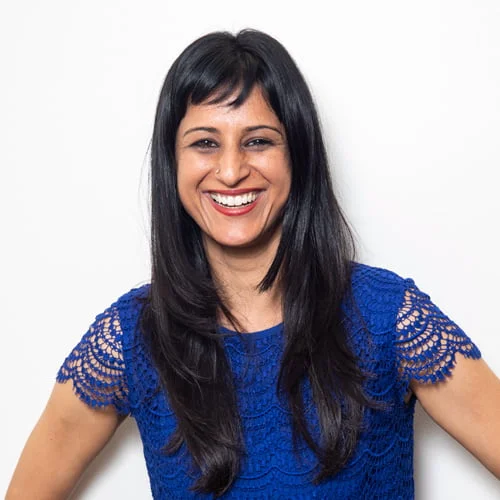

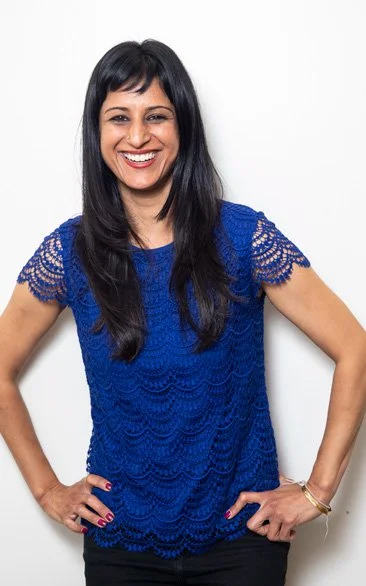
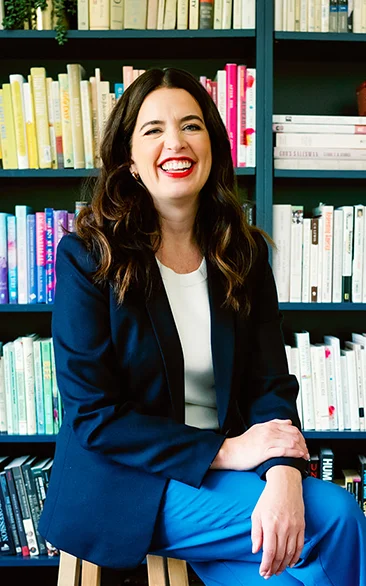








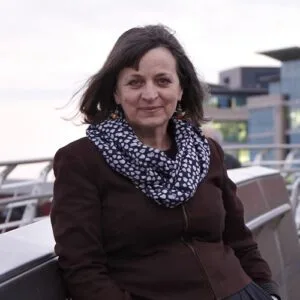
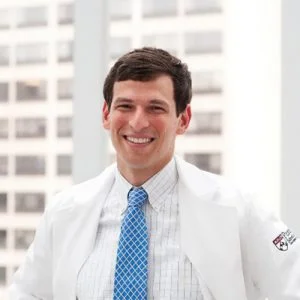


Leave a Reply